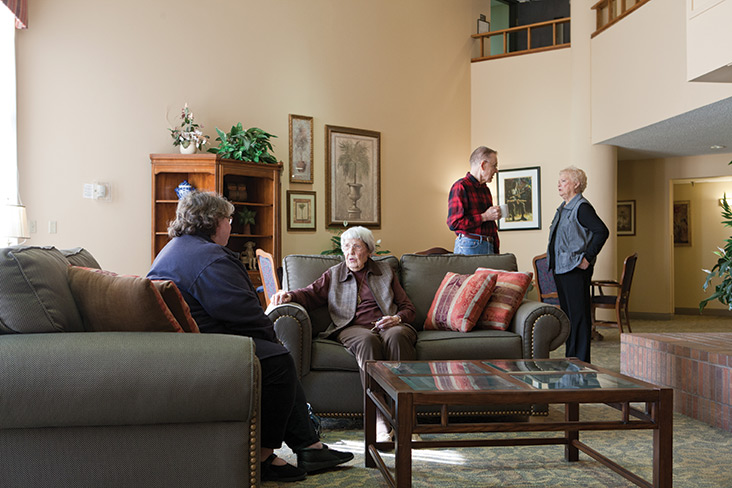
Balancing independence with assistance.
Change is the only constant in life, and therefore it is inevitable that our grandparents and parents will enter their golden years. It’s not easy — those years can present many challenges to overcome — but with help from professionals in the field and enough resources to guide us, we can respectfully support our loved ones into their final phase of life.
“Adult children should remember that their parent is still their parent,” says Jessie Kwatamdia, executive director for the Greater Missouri Chapter of the Alzheimer’s Association. “Be respectful. Try not to treat them as a child, and always ask for their opinion.”
Kwatamdia believes that communication is key as our parents age, and she suggests that adult children sit down with their parents and ask questions to determine their struggles. “Do they need help with taking medication? Is their health failing? Have they gotten into accidents? And so forth,” she says.
Maintaining Independence
If safety or health is a concern, Kwatamdia recommends considering what type of insurance they carry, how much will it cover, and what their out-of-pocket expense will be. She says the decision-making is easier when the parent is driving the process.
“The aging adult should oversee his or her decisions,” says Dr. Paul Tatum, a family and community medicine physician at MU Health Care, “but adult children should be prepared to represent the wishes of the aging parent if cognitive impairment or illness impairs the ability to represent themselves. The key is having conversations ahead of time.”
Tatum recommends asking your parents questions like these:
What is important to you?
Do you understand your medical conditions and the prognosis?
What are your fears about what’s to come?
What are your goals with the time we have left?
What trade-offs are you willing to make?
Tatum specializes in geriatric medicine as well as palliative medicine and hospice. Since 2000 he has worked as a geriatrician, a primary care physician for older adults, a consultant, and as a medical director for nursing homes and hospices. He says that it’s important to remember that, despite physical limitations, most aging parents are quite capable.
“For aging parents with memory problems, however, support becomes a tricky balance of maximizing the independence of the parent and more trade-offs to protect the parent if the memory problems advance to full dementia,” Tatum says. “Early recognition of memory problems and planning ahead can make a difference.”
Kwatamdia advises that the adult child regularly check in on the parent and to assist with chores that need completion, such as mowing the lawn or getting groceries. It may also be helpful for the adult child to go to the parent’s doctor’s appointments with him or her.
“I would say the key consideration is preserving the independence of aging parents while maintaining a balance of safety,” Tatum says. “Of course, not every aging parent is the same. Some 70-year-olds can be quite frail, while some 90-year-olds remain vigorous.”
According to Tatum, driving is a key component of maintaining independence for older adults in the United States.
“In fact, most older adults are safe drivers,” he says. “There are challenges of slowed reaction time and reduced vision for some drivers, but many resources exist to make driving safer. For older adults with dementia, severe visual impairment, or impaired reaction time, giving up driving is sometimes necessary. The key for adult children is to help coordinate transportation alternatives that maintain independence.”
Kwatamdia recommends building a support system by evaluating if other siblings or neighbors can check in on the parent. For adult children who don’t live close to their parents, Tatum says that a geriatric care manager, usually a nurse or social worker who joins the patient at doctor visits and helps coordinate care, can be a valuable resource.
“And of course, it’s important to talk about the financing of longevity,” Tatum says. “For example, many older adults are unaware that nursing home costs are not covered by Medicare. What’s the plan if you’re not safe to live at home?”
While terms like “living wills” and “advance care planning directives” can sound scary, Tatum recommends that aging adults establish a formal representative for their health, designating that person with medical power of attorney. Planning for this can, by itself, be a profound way to put some independent control into an otherwise dependent situation. “I like to introduce this topic with the simple question,” Tatum says. “‘If you were suddenly sick and couldn’t speak for yourself, who is the best person to represent your wishes?’”

The Need for Assistance
When the tasks of assisting an aging parent prove to be too much for loved ones to handle themselves, assisted living facilities can provide peace for the family and community for the parent.
“Moving to assisted living, a long-term care unit, or an aging-in-place center is a complex and emotional decision,” Tatum says. “Be mindful of the emotions involved while exploring this. For some older adults, a move can come as a big relief, while for others, it’s devastating.”
Kwatamdia notes that moving may mean parents are leaving their friends, church, even their grocery store. “Everything that made where they were home,” she says. “If not carefully thought through, it can bring on other issues, such as depression.”
Kim Fanning, executive director at Provision Living, says that an assisted living community can help meet some of those needs by providing purposeful living in an engaging environment.
“Our residents feel they can contribute and make a difference,” says Fanning. “When not engaged in active living, residents can become overwhelmed with boredom. Their world gets smaller and smaller every day. Many don’t realize how lonesome they really are. By changing address, they’re not giving away their personhood or their free will to navigate their lives, but rather they have time and energy to focus on the things they want to, and they leave the burdensome things, like shopping, cleaning, cooking, and laundry, to us.”
Fanning believes that safety is a key issue to address as adults enter their senior years and consider living arrangements. Seniors’ frailty can put them at a greater risk of being exploited if they search for new living arrangements on their own.
“Protective oversight” is an assisted living regulation in Missouri that creates peace of mind for families. The regulation states, “Protective oversight shall be provided twenty-four (24) hours a day,” and includes provisions if the resident leaves the facility voluntarily.
“Here at Provision Living we do a lot of ‘discreet surveillance,’ and our wonderful care staff and licensed nurses make this possible 24/7,” says Fanning. “This allows us the opportunity to pick up on subtle changes and catch concerns early.”
Fanning says that the nutritious meals, correctly administered medication, and mental and physical stimulation of an assisted living environment often result in significant improvements in the resident’s life.
“Many of our residents often say, ‘I wish I’d done this sooner,’” Fanning says. “Their ability to live more independently without putting pressure on family members is actually enhanced.”
Regardless of our elders’ living situations, Fanning, Kwatamdia, and Tatum all agree that timely and abundant communication is the key in guiding them through their golden years.
“Children of adult seniors are often overwhelmed with the fear that their loved one needs more assistance and support than they’re willing to accept or admit,” says Fanning. “Many times, putting off decisions results in a catastrophic situation when there simply is no time left to make an informed decision or choice.”
May we give our aging parents the care, support, and love that they gave to us.
Resources for Family Members
Area Agencies on Aging
health.mo.gov/seniors/aaa
573-526-4542
Columbia Senior Activity Center
columbiaseniorcenter.com
573-874-2050
Alzheimer’s Association
Alz.org
1-800-272-3900
The Health in Aging Foundation
healthinaging.org
MU Family Caregivers Conference
musomcme.com/caregiver
AARP Safe Driving Online Course
aarp.org/auto/driver-safety


